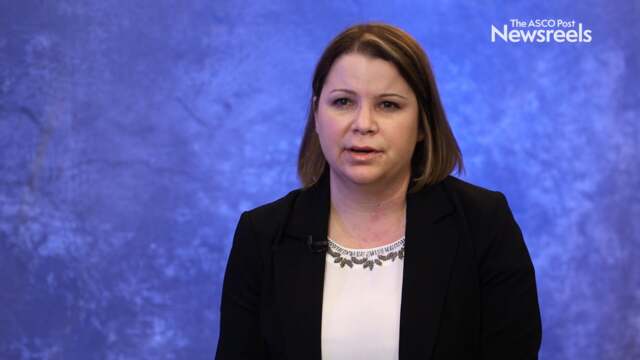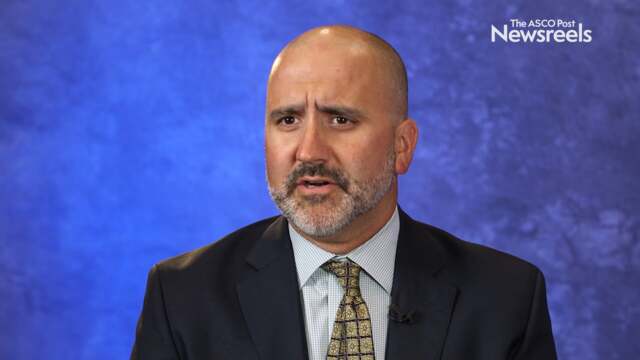Expert Point of View: Shitanshu Uppal, MD
COMMENTING ON the study, invited discussant Shitanshu Uppal, MD, of the University of Michigan in Ann Arbor, called the data “provocative” but said he had progressed through the “five stages of grief” in reaction to the results. “I’ve gone through denial, I’ve gone through anger, I couldn’t...
Poorer Outcomes Reported With Minimally Invasive Surgery Than Open Approach in Early Cervical Cancer
PATIENTS UNDERGOING minimally invasive radical hysterectomy for early cervical cancer had higher rates of disease recurrence and worse disease-free, progression-free, and overall survival than did women who had the open approach, according to results from the phase III LACC trial, presented by...
Expert Point of View: Oliver Dorigo, MD, PhD
COMMENTING ON the study, invited discussant Oliver Dorigo, MD, PhD, of Stanford University, said that tumor size and disease site are useful clinical parameters for predicting nonresponse to immunotherapy and should be considered when selecting and “unselecting” patients for immunotherapy...
Clinical Findings Predict Early Treatment Discontinuation in Patients Receiving Immunotherapy for Ovarian Cancer
PRETREATMENT CLINICAL findings may predict early treatment discontinuation in patients with ovarian cancer receiving checkpoint blockade immunotherapy agents. Data presented by MD candidate Julia L. Boland at the 2018 Society of Gynecologic Oncology Annual Meeting on Women’s Cancer revealed that...
Addition of Pazopanib to Paclitaxel in Persistent or Recurrent Ovarian Cancer
In a phase II trial reported in JAMA Oncology by Debra L. Richardson, MD, of Stephenson Cancer Center, Oklahoma University Health Science Center, and colleagues, the addition of pazopanib (Votrient) to paclitaxel did not improve progression-free survival among women with persistent or recurrent...
HPV Vaccine Could Have Prevented My Cancer
In the fall of 2015, I was feeling great. At age 37, I had just completed running my fourth half-marathon and regularly hiked trails near my home in Arlington, Texas, to stay fit in-between races. The only symptom that foretold what was in my future was some light watery discharge I was...
Juliet Elizabeth Wolford, MD, on Ovarian Cancer: The Cost of Care
Juliet Elizabeth Wolford, MD, of the University of California, Irvine, discusses the cost-effectiveness of various types of maintenance therapy in advanced ovarian cancer: paclitaxel, bevacizumab, niraparib, rucaparib, olaparib, and pembrolizumab (Abstract 5508).
Robert L. Coleman, MD, on Ovarian Cancer: Results From an NRG Oncology/Gynecologic Oncology Group Trial
Robert L. Coleman, MD, of The University of Texas MD Anderson Cancer Center, discusses phase III study findings on secondary surgical cytoreduction followed by platinum-based combination chemotherapy, with or without bevacizumab, in platinum-sensitive, recurrent ovarian cancer (Abstract 5501).
Martee L. Hensley, MD, on Leiomyosarcoma: Results From a GOG Treatment Trial
Martee L. Hensley, MD, of Memorial Sloan Kettering Cancer Center, discusses phase III study findings on adjuvant gemcitabine plus docetaxel followed by doxorubicin vs observation for uterus-limited, high-grade leiomyosarcoma (Abstract 5505).
Ursula A. Matulonis, MD, and Daniel J. Margul, MD, PhD, on Cervical Cancer and Minimally Invasive Surgery
Ursula A. Matulonis, MD, of Dana-Farber Cancer Institute, and Daniel J. Margul, MD, PhD, of Northwestern University, discuss the outcomes and costs of open, robotic, and laparoscopic radical hysterectomy for stage IB1 cervical cancer (Abstract 5502).
Ursula A. Matulonis, MD, and Stéphanie Gaillard, MD, PhD, on Ovarian Cancer: Results From an NRG Oncology/COG Trial
Ursula A. Matulonis, MD, of Dana-Farber Cancer Institute, and Stéphanie Gaillard, MD, PhD, of Duke Cancer Institute, discuss an evaluation of bevacizumab in the primary treatment of advanced ovarian cancer (Abstract 5517).
David M. O’Malley, MD, on Ovarian Cancer: Early Results From the FORWARD II Study
David M. O’Malley, MD, of The Ohio State University College of Medicine, discusses phase Ib study findings on mirvetuximab soravtansine, a folate receptor alpha-targeting antibody-drug conjugate, in combination with bevacizumab in patients with platinum-resistant ovarian cancer (Abstract 5549).
Kathleen N. Moore, MD, on Ovarian Cancer: Results From the QUADRA Study
Kathleen N. Moore, MD, of the University of Oklahoma Health Sciences Center, discusses phase II study findings on niraparib in patients with relapsed ovarian cancer who have received three or more prior chemotherapy regimens (Abstract 5514).
Martee L. Hensley, MD, on Leiomyosarcoma: Results From a GOG Treatment Trial
Martee L. Hensley, MD, of Memorial Sloan Kettering Cancer Center, discusses phase III study findings on adjuvant gemcitabine plus docetaxel followed by doxorubicin vs observation for uterus-limited, high-grade leiomyosarcoma (Abstract 5005).
How a Recent Study Heats up the Debate Over Intraperitoneal Chemotherapy in Newly Diagnosed Advanced Ovarian Cancer
Based on pharmacokinetic and preclinical data, there appears to be a biologic advantage to the use of intraperitoneal chemotherapy in treating some malignancies confined to the abdomen. Since most ovarian, fallopian tube, and peritoneal cancers present and recur in the peritoneal cavity, this...
Adding Hyperthermic Intraperitoneal Chemotherapy to Cytoreductive Surgery Improves Outcomes in Advanced Ovarian Cancer
In a Dutch/Belgian phase III trial reported in The New England Journal of Medicine by Willemien J. van Driel, MD, PhD, of the Netherlands Cancer Institute, and colleagues, the addition of hyperthermic intraperitoneal chemotherapy (aka HIPEC) to interval cytoreductive surgery following neoadjuvant...
Patient Attitude May Play a Part in Fears About Gynecologic Cancer Recurrence
CONCERNS ABOUT how recurrence of gynecologic cancer can affect a person’s life, and not simply fear of recurrence alone, play an important role in patient distress and functional impairment, according to a presentation at the 2018 American Psychosocial Oncology Society (APOS) Annual Conference in...
Follow-up Too Short in Ovarian Cancer, Too Long in Other Gynecologic Malignancies
A STANDARDIZED 5-year period of surveillance by a gynecologic oncologist was found to be inadequate for some gynecologic cancers and excessive for others, according to research presented by Robert Dood, MD, of The University of Texas MD Anderson Cancer Center, Houston, at the 2018 Society of...
Expert Point of View: Oliver Dorigo, MD, PhD
COMMENTING ON THE study by Cybulska et al, invited discussant Oliver Dorigo, MD, PhD, of Stanford University, said several important questions still need answers. “Tumor immune scores differ between metastatic sites, but how do these immune scores predict response to immunotherapy? And how does...
Microenvironment Heterogeneity May Contribute to Lack of Immunotherapy Success in High-Grade Serous Ovarian Cancer
INTER- AND INTRAPATIENT heterogeneity of the tumor microenvironment may explain the limited success of checkpoint blockade thus far observed in patients with advanced high-grade serous ovarian cancer, according to Paulina Cybulska, MD, MSc, of Memorial Sloan Kettering Cancer Center in New York....
Leading Health Organizations Issue Challenge to Defeat Cervical Cancer
The Consortium of Universities for Global Health, Perlmutter Cancer Center, and the Department of Population Health at NYU Langone Health are issuing the “New York Challenge,” an ambitious campaign to end cervical cancer worldwide. They are challenging all nations to achieve a 70% human...
Addition of Pazopanib to Paclitaxel in Persistent or Recurrent Ovarian Cancer
In a phase II trial reported in JAMA Oncology by Debra L. Richardson, MD, of Stephenson Cancer Center, Oklahoma University Health Science Center, and colleagues, the addition of pazopanib (Votrient) to paclitaxel did not improve progression-free survival among women with persistent or recurrent...
E. John Wherry, PhD, Awarded SU2C Funding to Lead Investigation of Gynecologic Cancer Therapies
E. John Wherry, PhD, a cancer and immunology researcher at the Perelman School of Medicine at the University of Pennsylvania and one of the most highly cited investigators in his field, has been awarded a “Convergence 2.0” research grant by Stand Up to Cancer (SU2C) to investigate immune system...
USPSTF Recommends Against Screening for Ovarian Cancer in Asymptomatic Women
THE U.S. PREVENTIVE Services Task Force (USPSTF) recently published a final recommendation statement and evidence summary on screening for ovarian cancer. Based on its review of the evidence, the USPSTF recommends against screening for ovarian cancer in women who do not have any signs or symptoms...
Kathleen M. Schmeler, MD: A Gynecologic Oncology Activist for Underserved Women
Kathleen M. Schmeler, MD, Associate Professor in the Department of Gynecologic Oncology at The University of Texas MD Anderson Cancer Center and the Lyndon B. Johnson Hospital, was given the “Heroes in Medicine” award from Physician’s Weekly in May 2016. Her primary work is in cervical cancer...
Checkpoint Inhibition for Patients With Recurrent or Advanced Cervical Cancer: A Promising Strategy, but Which Patients Will Benefit the Most?
For nearly 20 years, chemoradiation using single-agent platinum therapy has been the standard of care for advanced or recurrent cervical cancer.1 More recently, the Gynecologic Oncology Group (GOG) 240 trial tested the addition of bevacizumab (Avastin) to platinum-based chemotherapy, which...
Pembrolizumab in PD-L1–Positive Advanced Cervical Cancer
As reported in the Journal of Clinical Oncology by Jean-Sebastien Frenel, MD, of the Institut de Cancerologie de l’Ouest, Centre Rene Gauducheau, Saint-Herblain, France, and colleagues, pembrolizumab (Keytruda) treatment was found to be active in patients with programmed cell death ligand 1...
Reports From the Journal of Clinical Oncology
Immunotherapy in PD-L1–Positive Advanced Cervical Cancer Pembrolizumab (Keytruda) treatment was active in patients with programmed cell death ligand 1 (PD-L1)–positive advanced cervical cancer enrolled in the phase Ib KEYNOTE-028 trial. The findings were reported by Jean-Sebastien Frenel, MD, of...
Olaparib Tablets for Maintenance Treatment in Ovarian Cancer
On August 17, 2017, olaparib -(Lynparza) in tablet form was granted regular approval for maintenance treatment of adult patients with recurrent epithelial ovarian, fallopian tube, or primary peritoneal cancer who are in complete or partial response to platinum-based chemotherapy.1,2 Olaparib...
Olaparib Tablets as Maintenance in BRCA1/2-Mutant Relapsed Ovarian Cancer
A phase III trial (SOLO2/ENGOT-Ov21) has shown improved progression-free survival with an olaparib tablet formulation vs placebo as maintenance therapy in patients with BRCA1/2-mutant platinum-sensitive relapsed ovarian cancer. These study results were reported by Eric Pujade-Lauraine, MD, of the...
PARP Inhibitors in BRCA-Related Ovarian Cancer—and Beyond!
Poly (ADP ribose) polymerase (PARP) inhibitors are among the most exciting new classes of oncology drugs, and their development has coincided with the increasing recognition of the therapeutic vulnerability in targeting DNA damage response and DNA repair. The initial clinical testing of PARP...
ARIEL3 Investigators Clarify the Effects of Rucaparib on the Liver
PRIMARY RESULTS from the randomized, placebo-controlled, phase III study ARIEL3—presented at the European Society for Medical Oncology (ESMO) 2017 Congress and published recently in The Lancet1—demonstrated that maintenance treatment with the poly(ADP-ribose) polymerase (PARP) inhibitor rucaparib ...
EXPERT POINT OF VIEW: Geraldine M. Jacobson, MD, MPH, MBA
GERALDINE M. JACOBSON, MD, MPH, MBA, ASTRO Secretary/Treasurer, Professor and Chair of Radiation Oncology at the West Virginia University School of Medicine, Morgantown, went into more detail about the importance of this study. “The study directly compared brachytherapy/chemotherapy, which we use...
Pelvic Radiation Therapy Preferred Over Brachytherapy Plus Chemotherapy in Treatment of High-Risk Endometrial Cancer
VAGINAL CUFF BRACHYTHERAPY plus chemotherapy failed to show superiority over pelvic radiation therapy for women with high-risk stage I–II endometrial cancer in a phase III trial.1 Furthermore, vaginal cuff brachytherapy plus chemotherapy led to more pelvic and para-aortic nodal recurrences and...
More Data From ESMO 2017
In GEICAM 2006-10, the addition of fulvestrant at 250 mg/d to anastrozole did not improve 5-year disease-free survival over anastrozole alone (91.0% vs 90.8%). “Immune induction” with chemotherapy or radiotherapy appeared to enhance response to nivolumab in women with metastatic triple-negative...
International Trials Reveal New Findings in the Management of Breast and Ovarian Cancers
The European Society for Medical Oncology (ESMO) 2017 Congress, held in Madrid, featured important news including at least seven practice-changing or potentially practice-changing trials, which are covered in recent issues of The ASCO Post. Here we present additional highlights of studies in breast ...
Expert Point of View: Markus Joerger, MD, PhD, and Domenica Lorusso, MD, PhD
PRESS CONFERENCE MODERATOR Markus Joerger, MD, PhD, of St. Gallen Cancer Center, Switzerland, indicated that prior to the current study, it was unclear whether chemotherapy followed by surgery would be superior to chemoradiotherapy. “I think we all agree that it has been confirmed as the standard...
Standard of Care Upheld for Locally Advanced Cervical Cancer
THE FIRST FORMAL comparison of two acceptable approaches to locally advanced cervical cancer has concluded that standard chemoradiotherapy is preferable to neoadjuvant chemotherapy plus surgery. The findings confirm what most specialists have believed to be the optimal treatment. The results came ...
Expert Point of View: Sandro Pignata, MD
FORMAL DISCUSSANT of ARIEL3, Sandro Pignata, MD, of the IRCCS National Cancer Institute, “Fondazione G. Pascale,” Naples, Italy, said: “This is new evidence for maintenance therapy with rucaparib [Rubraca]. These results are extraordinary, particularly in the BRCA mutation patients, but also in...
Strong Showing for Rucaparib Maintenance Therapy for Platinum-Sensitive Ovarian Cancer
EVIDENCE CONTINUES to mount for the benefits of poly (ADP-ribose) polymerase (PARP) inhibition in ovarian cancer. Rucaparib (Rubraca) maintenance therapy after response to platinum-containing therapy significantly improved progression-free survival in patients with recurrent ovarian cancer compared ...
Performance Measures for Cervical Cancer Screening
Health-care systems use performance measures for cervical cancer screening based on guidelines from such organizations as the American College of Obstetricians and Gynecologists to monitor the appropriateness of cervical cancer screening. According to the performance measure in the Healthcare...
Marcus E. Randall, MD, on Endometrial Cancer: Results From a Gynecology Oncology Group Study
Marcus E. Randall, MD, of the University of Kentucky, discusses phase III study findings on pelvic radiation therapy vs vaginal cuff brachytherapy followed by paclitaxel/carboplatin chemotherapy in patients with high-risk, early stage endometrial cancer (Abstract LBA1).
U.S. Preventive Services Task Force Recommends Screening Most Adult Women for Cervical Cancer
THE U.S. PREVENTIVE SERVICES TASK FORCE has posted a draft recommendation statement and draft evidence review on screening for cervical cancer. The Task Force recommends that primary care clinicians screen for cervical cancer in women ages 21 to 29 every 3 years with cervical cytology, more...
Update on Nonimmunotherapy Advances in Endometrial, Cervical, and Ovarian Cancers
AT THE 12TH ANNUAL New Orleans Summer Cancer Meeting, Thomas Herzog, MD, Deputy Director of the University of Cincinnati Cancer Institute and Professor of the Division of Gynecologic Oncology at the University of Cincinnati College of Medicine, delivered an update on nonimmunotherapy advances in...
Eric Pujade-Lauraine, MD, PhD, on Ovarian Cancer: Results From the SOLO2 Trial
Eric Pujade-Lauraine, MD, PhD, of the Université Paris Descartes, discusses phase III study findings on the efficacy of olaparib maintenance therapy in patients with platinum-sensitive relapsed ovarian cancer by lines of prior chemotherapy (Abstract 932PD).
Domenica Lorusso, MD, PhD, on Cervical Cancer: Results From a Trial on Treatment Regimens
Domenica Lorusso, MD, PhD, of the National Cancer Institute of Milan, discusses neoadjuvant chemotherapy followed by surgery vs concurrent cisplatin and radiation therapy in patients with stage IB2 to IIB squamous carcinoma of the cervix (Abstract 928O_PR).
Andrew R. Clamp, PhD, on Gynecologic Cancers: Results of the ICON8 Trial
Andrew R. Clamp, PhD, of The Christie NHS Foundation Trust, discusses his phase III study findings on dose-dense chemotherapy integration in first-line treatment of epithelial ovarian, fallopian tube, and primary peritoneal carcinoma (Abstract 929O).
Sandro Pignata, MD, PhD, on Ovarian and Related Gynecologic Cancers: Expert Perspective on Three Key Trials
Sandro Pignata, MD, PhD, of the Istituto Nazionale dei Tumori, summarizes findings from the ICON8 study on dose-dense chemotherapy integration in first-line epithelial ovarian/fallopian tube/primary peritoneal carcinoma treatment; the ARIEL3 study on rucaparib vs placebo in recurrent ovarian carcinoma; and the ENGOT-OV16/NOVA on quality of life in patients with recurrent ovarian cancer treated with niraparib (Abstracts 929O, LBA40, 930O).
Simone Koole, MD, on Ovarian Cancer: Results of the OVHIPEC Trial
Simone Koole, MD (and a PhD candidate), of the Netherlands Cancer Institute, discusses phase III findings on health-related quality of life after hyperthermic intraperitoneal chemotherapy for stage III ovarian cancer.
Mansoor Mirza, MD: Ovarian Cancer Treatment and Quality of Life
Mansoor Mirza, MD, of Copenhagen University Hospital, discusses quality of life in patients with recurrent ovarian cancer treated with niraparib (Abstract 930O).














